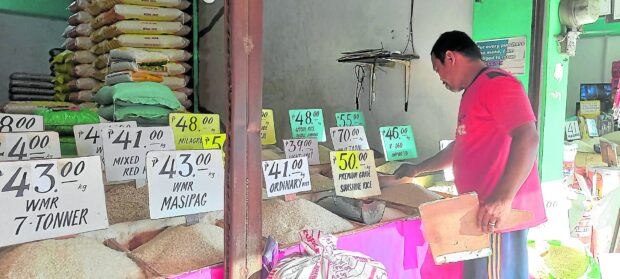
NEW TAGS | Rice dealers in a market in Kidapawan City put new price tags on their stocks in this photo taken on Aug. 5. Prices of both local and imported rice in Kidapawan have risen by as much as P5 per kilo, according to the grains retailer association in Soccsksargen region. (Photo by WILLIAMOR A. MAGBANUA / Inquirer Mindanao)
KIDAPAWAN CITY, Cotabato, Philippines — A dwindling supply has pushed prices of both local and imported rice up by as much as P55 per kilogram in the last two weeks and was projected to rise further in the coming days, grain retailers in Soccsksargen warned on Sunday.
Carmelito Bacus, president of the Grain Retailers Association Confederation in Soccsksargen, said they were only getting a limited supply of rice during the lean season, causing prices to increase at an average of P5 per kilogram in the last week of July and the first week of August.
While traders expected the mid-October harvest season in the region to boost local supply, rice prices would not likely go down because of existing rice export restrictions from India that have been keeping up the rice prices coming from Vietnam, a major source of rice imported to the Philippines, said Bacus.
Soccsksargen, formerly the Central Mindanao region, is composed of the rice-producing provinces of South Cotabato, Cotabato, Sarangani, and Sultan Kudarat, and the cities of General Santos, Kidapawan, and Koronadal.
As of Saturday, the rice sold at the Kidapawan Mega Market ranged from P44 per kilogram (local variety) to P55 per kilogram (imported grain), depending on its variety and country of origin.
This was an increase from the prices in June when the cheapest local rice varieties only cost P39 per kilo while the imported kind ranged from P45 to P47 per kilogram.
“Now, the cheapest local rice already costs P2,200 per [50-kilogram] sack, while the imported ones cost at least P2,500 per sack,” Bacus said.
Cash flow affected
Most of the local grains sold in the city’s central district came from the farming town of Mlang in Cotabato province and from Bukidnon province, while the stocks of imported rice mainly came from Davao City.
Bacus said the high prices of rice also affected their daily cash flow as most of their buyers already preferred buying in small volumes instead of in bulk.
Lately, retailers were only selling an average of 15 sacks a day for both local and imported rice, which was lower than the 25 to 30 sacks a day they were selling in the first quarter of the year when the market was still flooded with rice from Vietnam and Thailand, he said.
No NFA rice available
“The successive increases in prices prompted consumers to buy in kilograms instead of in sacks,” Bacus said.
Since the cheap rice sold by the National Food Authority (NFA) could no longer be found in any public market in the region except in Kadiwa stores of the Department of Agriculture, it also meant that the poor had been forced to buy expensive rice in the market, Bacus said.
This developed as more than 30,000 individuals had already benefited from the cheap rice sold at P20 per kilogram by the city government of Kidapawan since March this year.
Under the program, the city government earmarked P11 million this year as assistance to accredited farmers, allowing the city to buy palay at prevailing NFA prices, mill the grain, and sell it to residents at P20 per kilogram.
While the cheap rice used to be available only on Saturdays at the Mercado Kidapaweño, Mayor Jose Paolo Evangelista said the local government would directly bring the cheap price to the targeted 300 poorest households in the city.
He said the local government would rely on barangay nutrition scholars and village officials to identify the poor families who could buy cheap rice from the local government.
“We will continue our advocacy as we pour more funds for our buyback program to encourage more farmers to sell their produce to the city government,” Evangelista said.
RELATED STORIES
Planned gov’t-to-gov’t rice importation bucked
Bongbong Marcos on P20/kg rice: ‘We’re not there yet, but we’re doing everything we can’